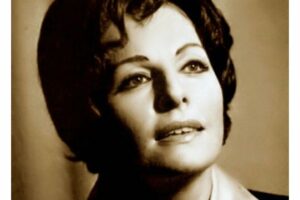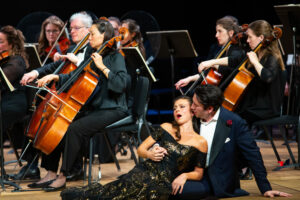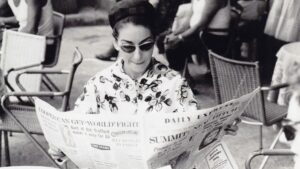
Our Doyenne demonstrated her omniscience once again by sending me a DVD
of Rimsky Korsakov’s Le Coq d’Or (Zolotoy Petushok) to review. I’m with musicologist Richard Taruskin who stated that Rimsky Korsakov was “perhaps the most underrated composer of all time” (and I’m sure his editor insisted on including the “perhaps”).
Nothing quite matches his operas for their folk-music inflected, pantheistic ecstasy, the way the vocal lines float over his luminous orchestral writing and the way he treats myths like historical dramas and treats historical dramas like myths.
Outside of Russia, Le Coq d”Or is perhaps his best known opera, even if it is not his best one – that honor should go to The Legend of the Invisible City of Kitezh and the Maiden Fevroniya, This work’s popularity may be due to its superficial similarity to “Scheherazade” as another of Rimsky-Korsakov’s bravura exotic entertainments, but this could not be farther from the composer’s intentions. He wrote this piece, based on Pushkin, as a vicious political satire of Russia’s military incompetence.
When it first came to the US (on a double bill with Cavalleria Rusticana!), it was right after the Bolshevik revolution, the indictment of the Russian tsarist government was hard to miss. Over time, however, this opera seems to have been robbed its satiric edge in performance, with this production filmed at the Chatelet in Paris as a case in point.
This production by noted Kabuki actor Ennosuke Ichikawa, travelled widely before arriving in Paris for the performances filmed here. As Isao Takashima receives director’s credit for these performances, it’s impossible to tell if this is only a partial realization of the original conception.
As presented, it combines both Western and Japanese theatrical techniques and cultural references to create an elusive syncretic exoticism. The set is a large staircase decorated with only a few simple scenic elements. They are set against a plain backdrop that shifts in color of the course of the performance. In contrast to the austere set, the cast is done up in fantastical costumes that blend Slavic, samurai, and Lady Gaga in a giddy mix, that give the show most of its theatrical oomph.
The performers are made up to look as if they are wearing kabuki masks and wield Japanese fans for dramatic emphasis. They move in a highly stylized fashion that is mesmerizing to watch and some stunning tableaux are created over the course of the performance. However, this approach creates a tragic, somber tone that is at odds with the material. It gives risible king Dodon an unearned nobility and seriously dulls the piece’s cutting edge.
Also, the performers struggle to put across their characters, given the constraints of the production. Only soprano Olga Trifonova manages to offer a compelling portrayal as the scheming Queen of Shemakha. but she does this by largely breaking the rules, vamping it up onstage and playing directly to the audience. It’s unclear whether this was her idea or the director’s, but the effect is that of Zerbinetta ending up in Kurosawa’s Ran on her way to Naxos. She is also the star musically, even if she lacks the ideal vocal glamour for the part and sounds less than beguiling on climatic high notes.
Barry Banks is the Astrologer. He handles this high-lying, challenging part with ease, but doesn’t quite catch the character’s ambiguously malevolent nature. Albert Schagidullin is rather blustery as doomed King Dodon and tends to be overshadowed on stage by the others in the cast. Yuri Maria Saenz dispatches the cockerel’s music and King Dodon’s fate with equally vehement abandon. Kent Nagano leads the Orchestre de Paris and Mariinsky Chorus in a performance that is technically impressive if overly subdued.
This Arthaus Musik DVD is a re-issue of a 2002 performance originally published on the TDK label. This work certainly merits an alternative version on DVD. Still, we Coq lovers will take what we can get.




























Comments